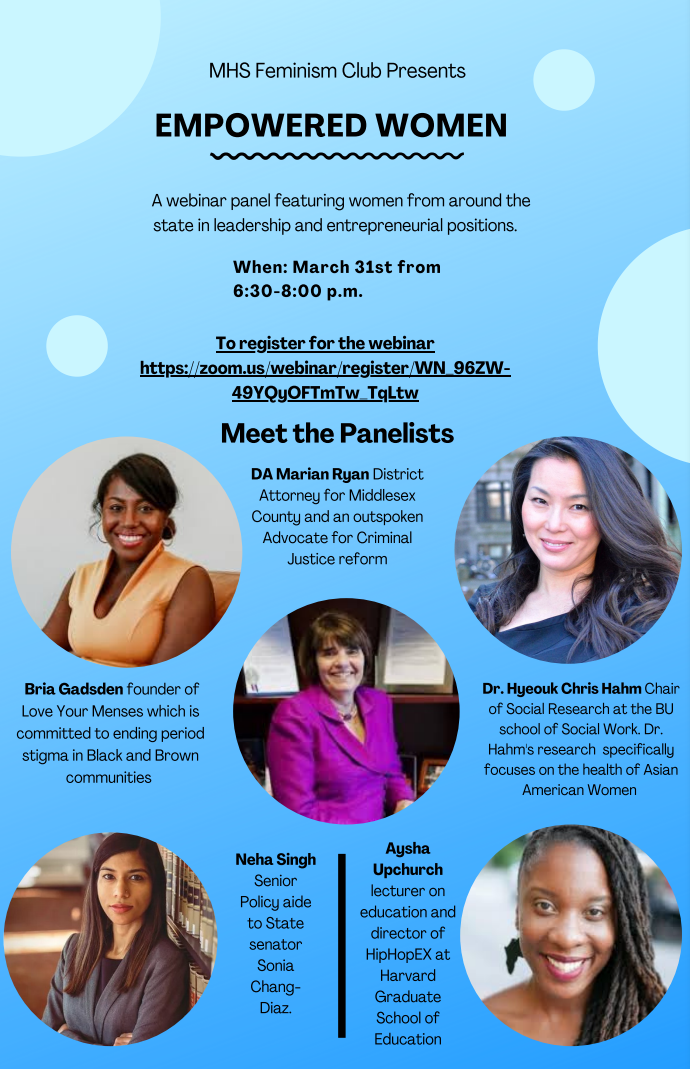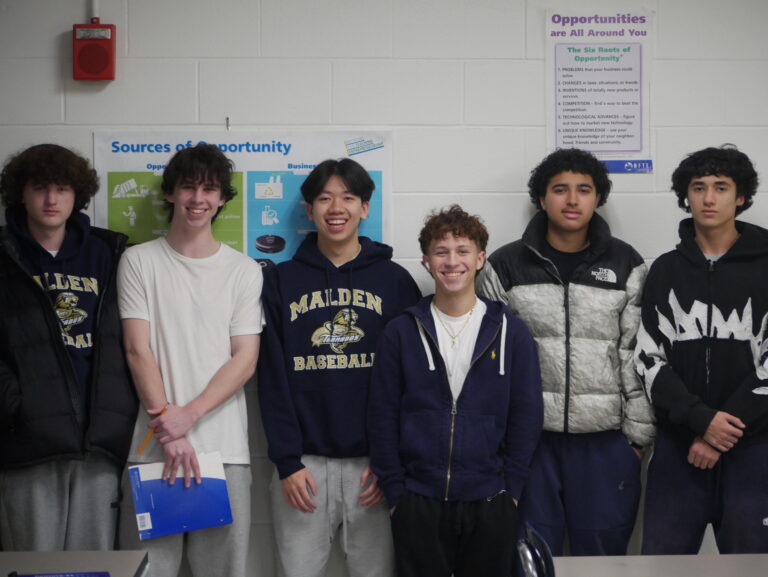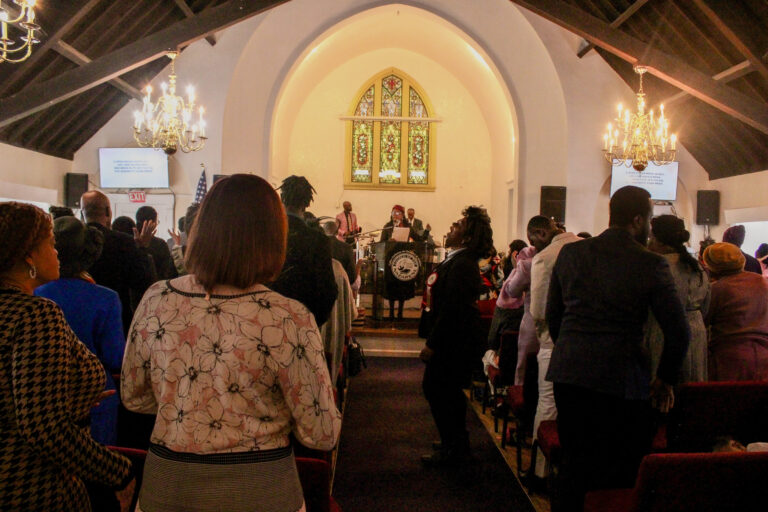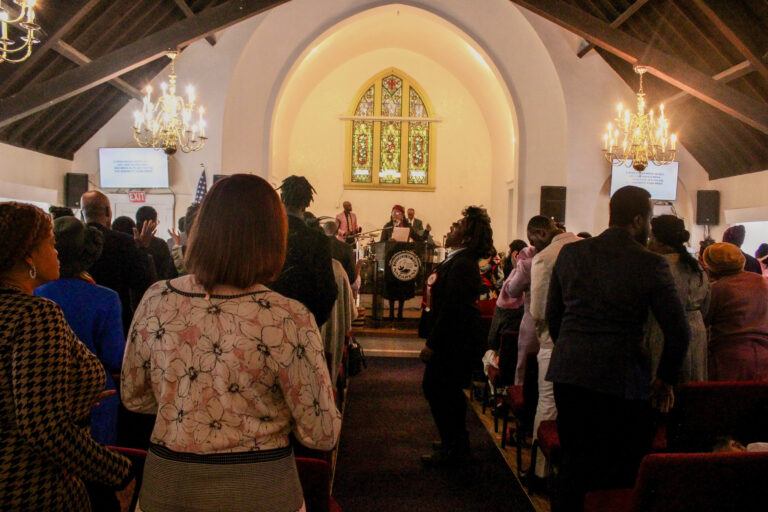
A flyer for the Empowered Women Webinar. Photo via Kerry Veritas.
The Empowered Women Webinar Panel was hosted on March 31st by the Malden High Feminism Club. The panel featured five women and asked them questions about their experiences that they have had as women in today’s society, talking about issues that are not getting enough recognition and attention needed.
Kerry Veritas, the supervisor of the Feminism Club, has been wanting to do this event since last year where she was looking for women that are in positions of power and a diverse group of women to represent our students, but there was a shutdown right in the middle of what she was planning.
She also had help from Crystal Haynes, a reporter from Channel 25 News, who suggested the panelists and provided her with their contact information. During the event, the panelist spoke on topics that really mattered like the menstrual cycle. Bria Gadsden, the founder of Love your Menses, and helps Black and Brown girls in her program to feel comfortable and talk about this without feeling embarrassed about it.
“[There are] a lot of issues that affect women and oftentimes [they] suffer in silence,” Gadsden stated. It needs to start early rather [than] older, because the more we talk about it, the [more] likely it will be better for women to take care of their reproductive system and to advocate for [their] health in the healthcare system, and how to manage [their] symptoms and not have to suffer in silence.
Gadsen also said that “[she] did not start talking about menstruation until [she] fully understood my body and understood the menstrual cycle.” She realized that she wanted to speak out on the female body and teach other girls because of how messed up it is on our part that women have to call in sick and tell their job or school that they [will not] be able to make it because of how bad period cramps are and it goes back to not acknowledging or learning about their body.
Dr. Chris Halm, who is a Boston University school of social work and principal investigator of women’s sexual health, spoke on the issue that Asian American women go through and the hypersexualization that society has made them be, “typically the bias against Asian woman is that [they are] quiet, their submissive, and overly sexualized.”
That stems off of Asian American women not being looked at as actual human beings and [they are] seen as people who [do not] have that much power because of how the system was built to view them as such.
Aysha Upchurch, a lecturer on education and director of Hip Hop X at Harvard Graduate School of Education, calls herself “the dancing diplomat” because it honestly captures who she is and what she does. It can be disappointing to hear about the negative remarks about black women especially in mainstream media and social media, but Upchurch believes, “[she] wakes up knowing the truth of who [she is], and the truth about who black women are.”
She educates people to not be so focused on the degrading statements that are being upheld against Black women, and to have black women be surrounded by people who truly love them. She understands that if they focus on the negatives then they will focus on negative narratives you will completely lose sight.
Black women face challenges on a daily basis whether it is the hateful words aimed at them for the color of their skin tones or the stereotypes that are put onto them on a daily basis. Upchurch wants to remind little black girls that they [do not] need to hide their true selves and Black women as well that,
Upchurch stated that “Black women have either quite explicitly the leaders or on the front lines or [they have] been inconspicuous in the backgrounds making sure everything is okay.” Black women themselves have made many contributions to the world itself, and [do not] get enough credit for it.
District Attorney of Middlesex County Marian Ryan discussed the law field and how hard it can be because of the lack of balance that women get to have because of the work field [they are] doing.
The law field tends to be a male-dominated area of work and it can be hard for a woman to be addressed more than soft and polite because they have men constantly looking down on women and seen as weak.
Neha Singh, senior policy aide to state senate Sonia Chang, had said “been in situations where [she] felt that [if she] spoke up [her] voice would not be heard or it would not be met at the level of openness,” talking about her experiences and being open about the struggles that she has faced, and it needs to be talked about because she [did not] felt like she was being heard in the world.
Singh went on to talk about her culture and says, “[she] grew up in India when [she] was young; it was not common for women to actively fight for their rights.” It frustrated her because she wanted to be a political advocate for women and their rights and this made her realize why it is so important to talk about them.
Veritas not only wants more recognition of the feminism club but she also wants this club to get started at the K-8 schools, to let little girls know that it is their club too and that they can have voices as well.
Overall, these five women spoke out about topics that are rarely talked about, even if they are sometimes shut down. It was a space where women had their voices being heard and it was so safe because of how well they were bonding with each other and relating to the same points and views.





